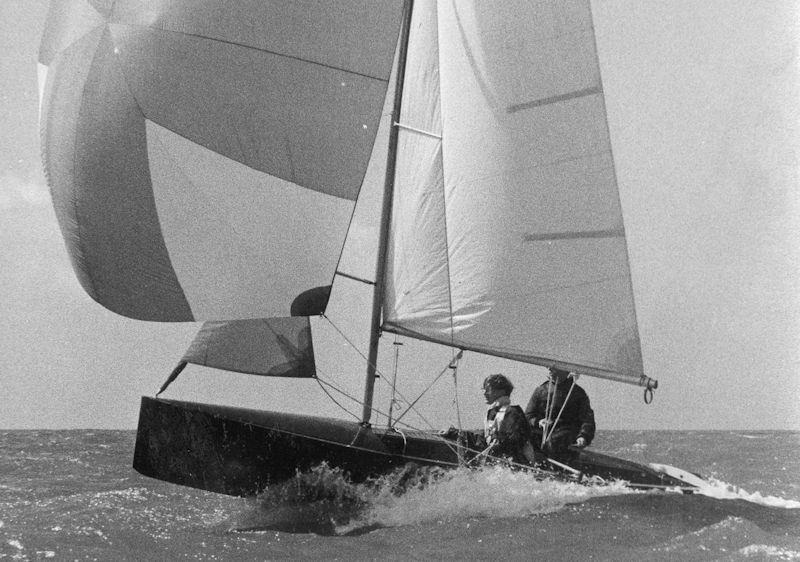
Ghost Hunting
by Dougal Henshall 7 Oct 2018 12:00 BST

The Ghost being sailed with a conventional spinnaker was one of the fastest boats of the day © Gregory family
It is now many years since my first ever linked series of articles appeared in print, when I wrote for Dinghy Magazine about some of the dinghy classes that had been lost through time. The series opened with a question; "Have you seen a Ghost?".
I went on to explain that I wasn't looking for the headless helm of Hayling, but the Greg Gregory designed speed machine of that name. Older readers will recall the Ghost as a stunning, lean, all varnished hull topped with a high aspect rig that included a semi-fully battened mainsail. (there were plenty of examples of fully battened mains around, but the semi-hard/semi-soft was something on an innovation at that time). Even more striking was the spinnaker, which was cut more like an asymmetric and was set off a 9ft long pole. Back in these pre-carbon fibre days, getting the required strength into a pole that long, without making it overly heavy, was an issue for the builders and even more so for the crews.
The over long pole was just one of the problems for the Ghost, as the boat was also a handful to sail, despite the implied promise of stability in the hard chine hull. For those younger sailors who have never heard of a Ghost, the best and simplest description is of a 15ft Cherub and indeed the designer, Greg Gregory, had made his name designing and racing UK versions of the Antipodean 12 ft mini-rocket.
The Ghost though was far from being an ethereal spirit, but instead was one of the quickest boats on the water at that time. At Hamble River SC, where they had regular class racing for their Flying Dutchman fleet, the Ghosts joined in with them on a level basis and on their day could beat the FDs on the water. But for all of that, the Ghost was something of a one trick pony and would struggle to gain a critical mass of acceptance in the UK, where it also suffered from the application of a painfully harsh PY. It wasn't that the boat was overly radical, but it was years ahead of its time and was not what the UK scene was looking for. However, in Australia they had other ideas and recognised the value in the boat and the way it performed, creating a modest fleet presence there.
At home though the Ghost was admired for it's looks and envied for its performance, but otherwise ignored and as the sales dried up, the boat was already heading for that headline as a Lost Class. But from the historical perspective, the Ghost makes an interesting case study, for although it may appear something of an evolutionary dead-end, there was enough innovative thinking applied to the boat to make it well worthy of a detailed investigation.
The only problem with this approach is that there are few examples of the Ghost left to document. Years ago, there was one, stored in a garage near Chichester, where the owner was hoping to restore it, but more recent searches have drawn a blank as to its fate. Another boat was known to be out on the Essex/Suffolk borders, but that boat too has vanished from the radar.
Which leaves the intriguing story of just one more boat, believed to be in a well-preserved state, cared for in an underground storage area in Geneva. The beauty of this boat is that the location where it is stored is temperature controlled and as the last known Ghost made in the UK/Europe, included a great deal of correspondence between Greg Gregory and the owner. This boat was last heard of a decade ago and a lot can – and sadly often does - happen in that passage of time, which all too often equates to yet another loss of a piece of our sailing heritage.
So, the question must be asked again! Have YOU seen a Ghost? Do you know of one, or have you heard of someone who has access to one and who would be prepared to let the boat be examined and photographed, so at least some detailed record of this exciting boat will be saved?
We can but hope that someone, somewhere, can shed some light on this topic and if one can be found, you'll be able to read about it here.